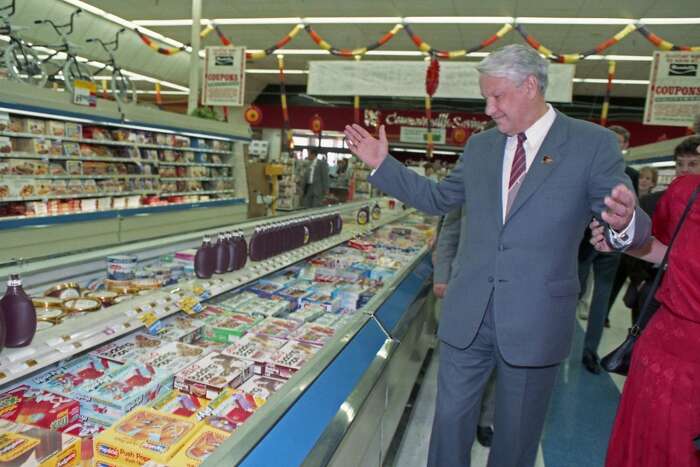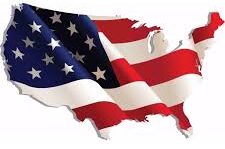What American invention best represents the success of our capitalist economic system? If I were to poll ordinary people on the street, I’d bet the most common answer would be the iPhone. If I could go back in time, and pose the same question to past generations, the most common responses would almost certainly be recent high tech inventions: automobiles, the skyscraper, airplanes, computers, the internet. But it was a much less heralded American invention that played a role in defeating communism, the supermarket. In the summer of 1989, future Russian president Boris Yeltsin was touring the United States, when he asked to make an unscheduled visit to a Houston supermarket. A visit that would help bring about the down fall of communism and the Soviet Union.

It was Sept. 16, 1989, Yeltsin had just completed a tour of NASA, when he asked to check out a local grocery store. His tour guides obliged, and they made a stop at the Randall’s Supermarket in Clear Lake, a suburb of Houston. Tagging along on the visit was Houston Chronicle reporter Stephanie Asin, who wrote, Yeltsin “roamed the aisles of Randall’s nodding his head in amazement.” Yeltsin remarked to his fellow Russians, that if people in the Soviet Union saw the conditions of U.S. supermarkets, “there would be a revolution.”
Yeltsin couldn’t believe the number and variety of products for sale, commenting, “Even the Politburo doesn’t have this choice. Not even Mr. Gorbachev”. He thought the store had been staged, an act of economic gamesmanship, but he quickly realized that stores like this were common in communities across America.
Over the years there has been speculation on the impact the supermarket trip had on Yeltsin’s thinking. With some boldly declaring that it shattered his view of communism. There’s no way of knowing exactly what his initial thoughts were, but what we do know is that it was an eye opening experience, so much so that Yeltsin writes about the visit in his autobiography. Yeltsin wrote, “When I saw those shelves crammed with hundreds, thousands of cans, cartons and goods of every possible sort, for the first time I felt quite frankly sick with despair for the Soviet people”.
Two months after Yeltsin’s supermarket trip, the Berlin Wall fell, marking the beginning of the end for the Soviet Union. The collapse of the Soviet Union would unfold over the next two years, culminating with Boris Yeltsin being named the first president of the Russian Federation. The man who 2 years earlier was shocked by the American supermarket, would end up being the leader who steered Russia away from Communism, pushing through economic reforms and transitioning the country towards a market economy.
While the Soviet Union would have dissolved with or without Yeltsin’s visit to Houston, I’ve always thought this was a particularly interesting anecdote. Some of our greatest economic achievements are things so ingrained in our daily lives, that we now take them for granted. The supermarket certainly falls into that category. But to an outsider who has never experienced such conveniences, they can be just as impressive as our most sophisticated technologies.
Fun Fact: During the Great Depression, the Soviet Union inadvertently alerted its citizens to the quality of life of ordinary Americans. Looking to take advantage of America’s economic hardship, the Soviets put together propaganda films showcasing the failure of the capitalist system. One of the propaganda films showed thousands of families fleeing the Midwest and the Dust Bowl. But rather than seeing it as an example of economic failure, the Soviet citizens only saw ordinary Americans who enjoyed a much higher standard of living than they did. The film showed the fleeing Midwestern farmers driving away, with all their belongings piled into the back of Ford Model T’s. The take away for those watching the propaganda, even poor people in America had cars, a luxury only the richest Russians could afford in those days. Not exactly the conclusion the propaganda film makers were hoping for.

Another fun fact … Nikita Khrushchev also visited an American supermarket during his first official visit to the US in 1959, a Safeway in San Francisco.
And… Kruschev’s “Kitchen Debate” with Nixon was played on American television with Nixon showcasing a “typical American home” at an exhibition in Moscow. Kruschev had all kinds of crazy claims about Soviet superiority and this “debate” launched Nixon toward the 1960 Rebuplican presidential nomination.
Did you visit Randall’s supermarket? Perhaps pick up some Cheese Whiz? From your earlier culinary descrptions that sounds like something that would be a part of your diet!
I did visit, but it’s no longer a Randall’s. No cheese whiz, most definitely not on my approved food list haha.